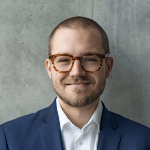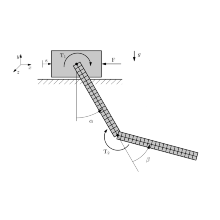Lecture content
The focus of this lecture is on the modeling and simulation of flexible multibody systems. Using the method of flexible multibody systems, machines, robots, vehicles and various structures can be investigated, which undergo both large nonlinear working motions and elastic deformations in service. Examples of flexible multibody systems are modern lightweight constructions, fast traversing machine tools as well as robots and machines with high precision requirements.
After a brief repetition of holonomic rigid multibody systems in tree structure, systems with kinematic loops and nonholonomic systems are discussed. Then after the presentation of different approaches for modeling flexible multibody systems the equations of motion using the floating frame of reference formulation are derived. This includes the description of the kinematics of an elastic body, the usage of different basis functions which approximate the elastic deformation, model reduction techniques, the kinetics of a free-cut body, its description with standard data, and a formalism to assemble the overall system. In addition, an introduction to the Matlab-based MBS program Neweul-M2 is given.
Furthermore, approaches are presented for the control of rigid and flexible multibody systems. At first inverse kinematics and inverse dynamics are shown for the control of rigid multibody systems. Subsequently, a survey of approaches and challenges in the control of flexible multibody systems will be given.
Finally, the modeling of contact problems in multi-body systems is discussed and the continuous contact model, the contact of flexible bodies and the extension to the discrete element method are presented.
The lecture is accompanied by exercises and practicals.
Lecture information
- Language
-
The lecture is taught in German.
- Credits
-
6 (4SWS)
- Time
-
Wednesday, 11:30-13:00, V9.41; Friday 8:00-9:30, V7.04, first lecture on April 13rd, 2022.
- ILIAS and C@mpus
-
Please register in the C@mpus-course. You will be automatically added to the ILIAS-course as soon as it is online.
- Practicals
-
In addition to the lecture, three practical exercises are offered. These can be accredited in the context of the Practical Training Technical Dynamics or as APMB experiments. Exercises are directly issued in the lecture.
- Contact person
- Additional Information
-
This course is given in German. For contents and lecture information, please refer to the German website.

Jörg Fehr
Prof. Dr.-Ing.


